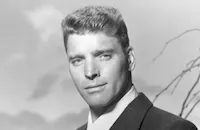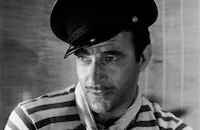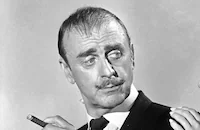Ten Tall Men

Brief Synopsis
Cast & Crew
Willis Goldbeck
Burt Lancaster
Jody Lawrence
Gilbert Roland
Kieron Moore
George Tobias
Photos & Videos
Film Details
Technical Specs

Synopsis
In the middle of the Sahara desert, French Foreign Legionnaires Sgt. Mike Kincaid, Corporal Luis Delgado and Corporal Pierre Molier travel disguised as an Arab merchant and his daughters, in an attempt to discover the whereabouts of a Riffian tribe led by the shrewd Caid Hussin. The men are stopped by a small Riff band, led by Hussin's lieutenant Yassif and when the Arabs grow suspicious, Mike and his men overthrow them and kidnap Yassif. In the city of Tarfa, Legionnaire Lt. Kruger struggles to keep order among the skeleton crew, who have been left at headquarters while Major Bertot and the 42nd Regiment are on maneuvers. When Mike and the men bring in Yussif, Kruger tries unsuccessfully to get him to reveal Hussin's location, but instead discovers Mike's interest in Marie DeLatour, Kruger's girl friend. Kruger goes to Marie's apartment, where he discovers her with Mike, who is arrested after striking Kruger. Delgado and Molier sneak Mike some food in jail, which he shares with Yussif, who is imprisoned in the cell next to him. In gratitude, Yussif advises Mike to escape, as Hussin will attack the nearly empty fort the following day. Mike demands to see Kruger and insists that with a squad of men he can stall the Riff attack for the five crucial days before the regiment's return. Kruger refuses to assign the few men defending the city to Mike and instead offers imprisoned soldiers, guaranteeing the freedom of any man who survives the mission. Delgado and Molier volunteer and the inmates agree to the plan, believing they will escape at the first opportunity. To their disappointment, they soon realize that Mike seriously intends to fulfill the mission. The men soon come across the camp of Sheik Ban Allal, where Mike notices several men in Hussin's tribal robes. Suspecting that the tent these men guard may be an ammunition dump, Mike and three men go undercover and sneak inside, only to find a harem of the sheik's daughter Mahla and her attendants. They are preparing for Mahla's wedding to Hussin, which will unite the two tribes. Sensing that the sheik is unhappy about the pending nuptials, and certain that a postponement of the wedding would interfere with the invasion plans on Tarfa, Mike kidnaps Mahla. She resists and makes several attempts to escape, causing the death of a soldier. That night, while Mike steals horses from a nearby Riff camp, the men, led by the lecherous Jardin, attack Mahla, but Mike returns in time to rescue her. Having followed Mike, the Riffs surround the soldiers and demand Mahla's return. Another soldier dies in the attack, but when a sandstorm hits, the remaining Legionnaires and Mahla escape and search desperately for water. Mahla bribes Jardin to help her escape when they reach an oasis. Nearby, the men discover a wrecked payroll truck filled with money, but Jardin, having been paid by Mahla, cautions the men that the money is traceable. That night, to protect her, Mike binds Mahla to him, and when she realizes Jardin intends to murder Mike, she warns him in time. Jardin breaks away with the payroll money but is shot by Delgado, alerting the Riffs to their location. The next day, Mike and Mahla lead a decoy of horses while the men head off on foot to the city. When the Riffs discover the ruse, they eventually capture the pair, but Mahla forbids Hussin to torture Mike for information about the regiment's return. Mahla demands that Hussin free Mike or she will refuse to marry him, and he complies. As the tribe hastily prepares for the wedding ceremony, Mike's men join them disguised in robes. During the ceremony the men cause a commotion, and Mike and Hussin fight over Mahla, but Ban Allal's tribe turns against Hussin and kills him. Upon returning to Tarfa, Mike and the men are awarded medals by Major Bartot and a resentful Kruger, as Mahla and her father watch in approval.

Cast

Burt Lancaster
Jody Lawrence

Gilbert Roland

Kieron Moore

George Tobias

John Dehner

Nick Dennis

Mike Mazurki
Gerald Mohr
Ian Macdonald

Mari Blanchard
Donald Randolph
Robert Clary
Henry Rowland

Michael Pate
Stephen Bekassy
Raymond Greenleaf
Paul Marion

Henri Letondal
Philip Van Zandt
Joy Windsor
Joann Arnold
Edith Sheets
Diana Dawson
Gwenn Caldwell
Helen Reichman
George Khoury
Ethan Laidlaw
Nick Cravat
Shimen Ruskin
Ralph Volkie
Frank Arnold
Alan Ray
Mickey Simpson
Robert Wood
Carlo Tricoli

Gregory Gay
Sherry Moreland
June Benbow
Benny Burt
Peter Virgo
Rita Conde
Charlita

Gene Gary
Tom Conroy
Shirley Whitney
Rube Schaffer
Crew
Robert B. Aldrich
Carl Anderson
James Warner Bellah
Earl Bellamy
David Buttolph
Clay Campbell
Thom Conroy
George Cooper
Francis Cugat
Frank Davis
Louis Diage
Willis Goldbeck
Harold Hecht
Helen Hunt
Roland Kibbee
Mitch Lindeman
Jean Louis
William Lyon
William Snyder
Morris Stoloff

Photo Collections
Film Details
Technical Specs

Articles
Ten Tall Men
Lancaster plays a cocky, womanizing Foreign Legion sergeant who learns of an impending Riff invasion while in jail, and buoyantly teams up with nine fellow prisoners to delay them until reinforcements can arrive. Along the way, a sheik's daughter (Jody Lawrance) gets involved.
Shot near Palm Springs and on soundstages at Columbia Pictures, the film was quite a bit behind schedule by midpoint in production. Additionally, Lancaster and Hecht were not satisfied with the tone that director (and co-writer) Willis Goldbeck had been achieving for the film. So Goldbeck was fired and replaced with Robert Parrish, a top editor who had been clamoring for a chance to direct. Parrish was happy for the opportunity but worried he'd be fired, too, if he slipped up. As it turned out, he brought the picture in on time and quickly went on to direct his first two official features, the superb film noirs Cry Danger (1951) and The Mob (1951). Goldbeck, however, received sole directing credit on Ten Tall Men.
The movie performed solidly at the box office and got fair reviews, with Variety describing it as "a virtual tour de force for Lancaster. He bares his hairy chest, wrestles adversaries, and pitches woo in the best tradition of such roles." The New York Times' Bosley Crowther wasn't crazy about the satirical approach, but wrote: "If your humor is in a tolerant state...you will find it a bushel of fun.... You will relish the way the fellows call Mr. Lancaster 'Sarge' or a sudden sandstorm sweeps the desert, permitting our hard-pressed heroes to escape. And you will cherish the international flavor of the Legion, imparted by such Orpheum-time vaudevillians as Nick Dennis, Mike Mazurki and George Tobias. Indeed, if you're utterly careless, you might even eat your popcorn bag in the midst of the excitement and amusement."
It was on this film that Burt Lancaster and Robert Aldrich first worked together (and possibly first met). Aldrich, credited as "assistant to the producer," was assigned to oversee the production by Columbia. He had already worked as an assistant director or second-unit director on many films, however, and would soon become a director in his own right -- one of the best, in fact. He'd direct Lancaster in four pictures, including Vera Cruz (1954) and Ulzana's Raid (1972).
Ten Tall Men followed Lancaster's previous film, Jim Thorpe -- All American (1951), in theaters by just one month. Biographer Kate Buford has written that this demonstrates "the style split of Lancaster's early 1950s career: serious effort followed by zany parody, each persona played off against the other with a circus performer's instinct for the next, quick surprise."
By Jeremy Arnold
Sources:
Kate Buford, Burt Lancaster: An American Life
Gary Fishgall, Against Type: The Biography of Burt Lancaster
David Fury, The Cinema History of Burt Lancaster

Ten Tall Men
Quotes
Trivia
Notes
Norma Productions was a company organized by Harold Hecht and Burt Lancaster (and named after his wife) in 1948 for joint productions. Hecht was listed as company president. Halburt Productions was another company organized by the two men in 1950. Hecht was again listed as president and by 1952, the two companies were housed out of the same office, but continued as independent concerns. According to Hollywood Reporter, nearly three weeks into principal photography, Willis Goldbeck asked to be removed as director of the film, citing differences with Burt Lancaster and Harold Hecht over changes made during production. The Screen Directors Guild later awarded Goldbeck full screen credit, even though the production was completed by Robert Parrish. The film marked the screen debut of Robert Clary. Portions of the film were shot on location in Palm Springs, CA.















